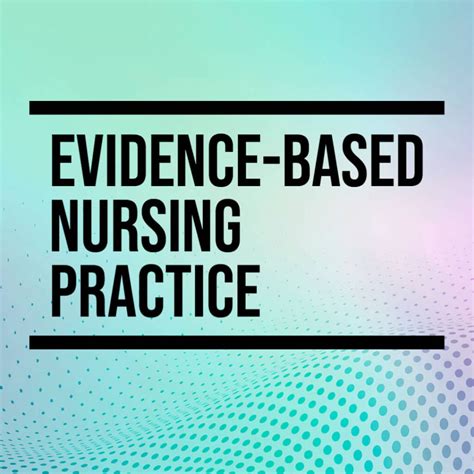Nursing, as a profession, has evolved significantly over the years, with a growing emphasis on evidence-based practice (EBP). EBP is an approach to healthcare that involves making decisions based on the best available evidence, rather than on tradition, intuition, or personal preference. In nursing, EBP is crucial in ensuring that patients receive high-quality, safe, and effective care.

In this article, we will explore seven ways nurses apply evidence-based practice in their daily work.
What is Evidence-Based Practice in Nursing?
Before we dive into the ways nurses apply EBP, let's first define what it is. EBP in nursing is the integration of best available research evidence, clinical expertise, and patient values to make informed decisions about patient care. It involves identifying a clinical problem, searching for relevant research, appraising the evidence, and implementing the findings into practice.
7 Ways Nurses Apply Evidence-Based Practice
1. Assessing Patient Outcomes
Nurses use EBP to assess patient outcomes and evaluate the effectiveness of their care. For example, a nurse may use a validated assessment tool to measure a patient's pain level and adjust their pain management plan accordingly. This approach ensures that patients receive individualized care that is tailored to their specific needs.

2. Developing Care Plans
Nurses use EBP to develop care plans that are based on the best available evidence. For example, a nurse may use a care plan template that is based on a systematic review of research on a specific condition, such as diabetes or heart failure. This approach ensures that patients receive care that is based on the latest research and guidelines.
3. Implementing Infection Control Measures
Nurses use EBP to implement infection control measures that are based on the latest research and guidelines. For example, a nurse may use a protocol for hand hygiene that is based on a systematic review of research on hand hygiene practices. This approach ensures that patients are protected from hospital-acquired infections.

4. Using Evidence-Based Interventions
Nurses use EBP to select interventions that are based on the best available evidence. For example, a nurse may use a cognitive-behavioral therapy (CBT) protocol to help patients manage anxiety or depression. This approach ensures that patients receive interventions that are effective and evidence-based.
5. Participating in Quality Improvement Initiatives
Nurses use EBP to participate in quality improvement initiatives that aim to improve patient outcomes and reduce healthcare costs. For example, a nurse may participate in a quality improvement project that aims to reduce hospital-acquired pressure ulcers. This approach ensures that nurses are actively involved in improving patient care and outcomes.

6. Staying Up-to-Date with the Latest Research
Nurses use EBP to stay up-to-date with the latest research and guidelines in their field. For example, a nurse may attend conferences or workshops, read journals, or participate in online forums to stay current with the latest research and guidelines. This approach ensures that nurses are knowledgeable about the latest developments in their field and can provide evidence-based care.
7. Collaborating with Interdisciplinary Teams
Nurses use EBP to collaborate with interdisciplinary teams to provide comprehensive care to patients. For example, a nurse may work with a team of healthcare professionals, including physicians, therapists, and social workers, to develop a care plan that is based on the best available evidence. This approach ensures that patients receive comprehensive care that is tailored to their specific needs.

Benefits of Evidence-Based Practice in Nursing
The benefits of EBP in nursing are numerous. Some of the benefits include:
- Improved patient outcomes
- Enhanced patient safety
- Increased patient satisfaction
- Reduced healthcare costs
- Improved nurse satisfaction and engagement
Gallery of Evidence-Based Practice in Nursing






What is evidence-based practice in nursing?
+Evidence-based practice in nursing is the integration of best available research evidence, clinical expertise, and patient values to make informed decisions about patient care.
Why is evidence-based practice important in nursing?
+Evidence-based practice is important in nursing because it ensures that patients receive high-quality, safe, and effective care that is based on the latest research and guidelines.
How do nurses apply evidence-based practice in their daily work?
+Nurses apply evidence-based practice in their daily work by assessing patient outcomes, developing care plans, implementing infection control measures, using evidence-based interventions, participating in quality improvement initiatives, staying up-to-date with the latest research, and collaborating with interdisciplinary teams.
In conclusion, evidence-based practice is an essential component of nursing care. By applying EBP, nurses can ensure that patients receive high-quality, safe, and effective care that is based on the latest research and guidelines. We hope that this article has provided you with a comprehensive understanding of EBP in nursing and its importance in improving patient outcomes.
